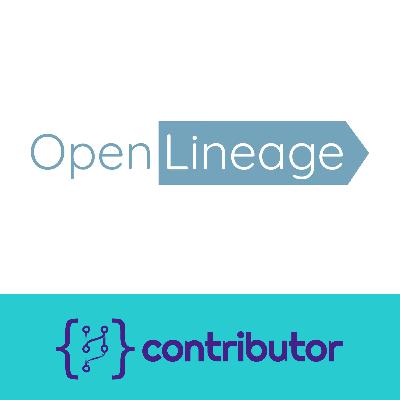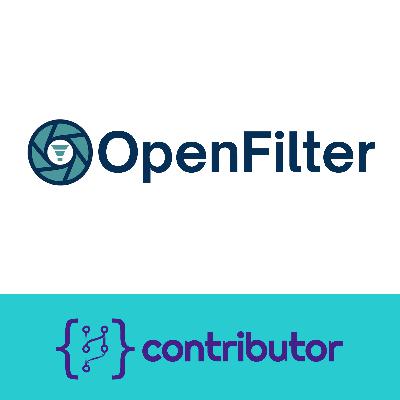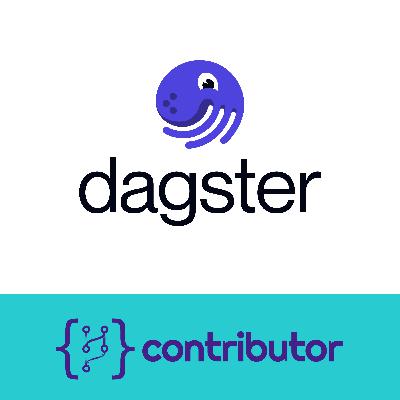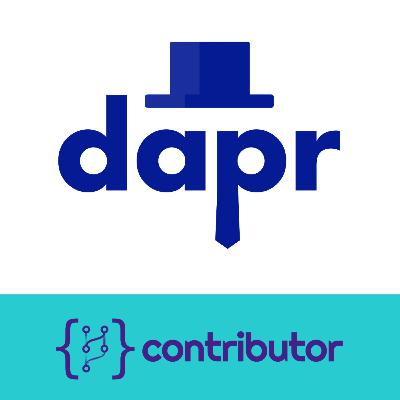Discover Contributor
Contributor

94 Episodes
Reverse
Willy Lulciuc (@wslulciuc) is a pioneer in data engineering and one of the creators of OpenLineage, the open-source framework for data lineage collection and analysis. It enables consistent collection of lineage metadata, giving engineers a better perspective on how data is produced and used, so they can better solve complex problems. Join us to learn about the evolution of data processing, the role of AI, and the future of data engineering.Subscribe to Contributor on Substack for email notifications!In this episode we discuss:Willy’s journey from WeWork to oleanderThe role of AI in data engineeringChallenges in data processing and observabilityA vision for the future of data platformsLinks:OpenLineageoleanderPeople mentioned:Julien Le Dem (@J_)
Andrew Smith (Github: @asmith-plainsight) dives deep into OpenFilter, the open-source framework for building computer vision workflows. Andrew is the CTO of Plainsight which is a leader in modern computer vision infrastructure. Tune in to find out how OpenFilter is simplifying and revolutionizing computer vision applications.Subscribe to Contributor on Substack for email notifications!In this episode we discuss:The challenges in deploying computer vision, particularly in edge environmentsHow Andrew’s time at Google influenced the development of OpenFilterThree problems Andrew sought to solve before open-sourcing the projectBest use cases for OpenFilterThe surprising nascence of computer vision applicationsLinks:OpenFilterPlainsightOpenLineagePeople mentioned:Kit Merker (@KitMerker)Willy Lulciuc (@wslulciuc)
Pete Hunt (@floydophone) joins Eric Anderson (@ericmander) to talk about Dagster, the open-source data orchestration platform built for productivity. In 2021, Eric interviewed Dagster’s founder, Nick Schrock, about an earlier iteration of the product. Now, four years later, Pete has become the CEO of Dagster Labs and has all the updates on how this platform has changed along with the industry and the world.Subscribe to Contributor on Substack for email notifications!In this episode we discuss:How and why Dagster has invested in software-defined data assetsNailing a layered approach between full-code engineering and low-code solutionsThe changing role of AI in data pipelinesDagster’s renewed effort to build observability toolsLinks:DagsterPeople mentioned:Nick Schrock (@schrockn)Other episodes:Dagster with Nick Schrock
Mark Fussell (@mfussell) is the co-creator of Dapr, the open-source runtime system designed to support cloud native and serverless computing. Dapr provides APIs that simplify the development of distributed applications, providing essential functionalities like service invocation, pub/sub messaging, and observability. Subscribe to Contributor on Substack for email notifications!In this episode we discuss:The difference between Dapr and a service meshHow Dapr is beneficial for platform engineering teamsFrom Microsoft to Diagrid in the startup worldThe significance of Dapr’s graduation from the CNCFLinks:DaprDiagridKEDAPeople mentioned:Yaron Schneider (@yaronschneider)Other episodes:Istio with Sven MawsonLinkerD with William MorganRobust Observability: OpenTelemetry with Austin Parker
Kee Jefferys (@JefferysKee) is the technical co-founder of Session, the end-to-end encrypted messenger that emphasizes user confidentiality and anonymity. Session uses a blockchain-based decentralized network for message transmission and is open-source, so the system can be run entirely by its community. In this episode, Kee explains the importance of reducing metadata, the challenges of centralization, and the role of incentives in creating a decentralized network. Contributor is looking for a community manager! If you want to know more, shoot us an email at eric@scalevp.com.Subscribe to Contributor on Substack for email notifications!In this episode we discuss:Why the demand for better privacy has increased How Session differs from other encrypted messaging platforms Combining encryption and incentive modelsWhy open-source is so critical to messaging applications trying to prove their securityHow Session could outlast its developersLinks:Session
Clément Salaün (@superzamp) is the co-founder and CTO of Formance, the open-source platform which is building an agnostic infrastructure for the future of the financial Internet. Formance is divided into several modules which allow fintech engineers to build and operate complex flow of funds, weaving together multiple payment rails with internal ledger accounts. Tune in to find out what it takes to build a scalable and extensible financial core system.
Contributor is looking for a community manager! If you want to know more, shoot us an email at eric@scalevp.com.
Subscribe to Contributor on Substack for email notifications!
In this episode we discuss:
How Clem got into fintech through Minecraft
Thoughts on the European open-source scene
Formance’s ratio of community size to Github stars
The influence of crypto on Formance
What it means to split an open-source project into many repositories
Links:
Formance
Gideon Mendels (Github: @gidim) is the co-founder and CEO of Comet, the end-to-end model evaluation platform for AI developers. Among the tools in the Comet ecosystem is Opik, an open-source solution for evaluating, testing and monitoring LLM applications. Opik allows users to log traces and spans, define and compute evaluation metrics, score LLM outputs, compare performance across app versions, and more. As a true open-source project, its full featureset is available for use by anyone, completely free.
Contributor is looking for a community manager! If you want to know more, shoot us an email at eric@scalevp.com.
Subscribe to Contributor on Substack for email notifications!
In this episode we discuss:
How Opik’s popularity blew up beyond the Comet team’s expectations
Why CI/CD is especially important in an end-to-end platform
Gideon’s “severe allergy” to “fake open-source” offerings
Why the number of dedicated machine learning engineers is actually going down
Eric’s thoughts on what it means for venture capital to invest in the LLM space
Links:
Opik
Comet
Hanson Ho (@bidetofevil) is an Android Architect at Embrace, the mobile-first observability solution built on OpenTelemetry. Embrace began as a proprietary platform but went open-source at the end of 2023. Hanson shares about how the project is still at the beginning of its open-source journey and why his team is committed to collaborative development with the larger community of OpenTelemetry.
Contributor is looking for a community manager! If you want to know more, shoot us an email at eric@scalevp.com.
Subscribe to Contributor on Substack for email notifications!
In this episode we discuss:
The missing piece in mobile observability tooling
How Embrace switched its perspective after going open-source
3 use cases for Embrace
Links:
Embrace
OpenTelemetry
Other Episodes:
Robust Observability: OpenTelemetry with Austin Parker
Stephan Ewen (@StephanEwen) is the co-founder of Restate, the open-source workflow-as-code engine. Restate is lightweight, simple, and provides durable execution. Before Restate, Stephan co-created Apache Flink, the open-source stream processing framework. Lessons learned from Flink have heavily influenced the development of Restate, although Stephan says they have exact opposite use cases.
Contributor is looking for a community manager! If you want to know more, shoot us an email at eric@scalevp.com.
Subscribe to Contributor on Substack for email notifications!
In this episode we discuss:
The history of Flink and the impact of the 2016 U.S. election
Why tooling for real-time transactional problems has historically had room for improvement
What constitutes “modern” workflow engines
Can you use Restate for any use case?
Moving from a large company to a small startup as an open-source developer
Links:
Restate
Apache Flink
People mentioned:
Kostas Tzoumas (@kostas_tzoumas)
Other episodes:
Temporal with Maxim Fateev
Eyal Solomon (@EyalSolomo44643) is the CEO and co-founder of Lunar, an open-source platform which bills itself as the “first reverse API gateway.” Lunar allows engineering teams to monitor, manage, and optimize API consumption. According to Eyal, it’s very easy to integrate with APIs, but difficult to keep them maintained, and there was a clear need for a generic solution to control and scale every API consumed in production.
Contributor is looking for a community manager! If you want to know more, shoot us an email at eric@scalevp.com.
Subscribe to Contributor on Substack for email notifications!
In this episode we discuss:
How most companies think their API maintenance is a unique problem
The importance of managing API consumption in the face of the AI revolution
Why Eyal and his team decided to open-source Lunar
Future plans for Lunar, including the development of autonomous optimization and pre-built flows
Eyal’s thoughts on how to start conversations with potential enterprise clients
Links:
Lunar
People mentioned:
Roy Gabbay (LinkedIn)
Shirshanka Das (@shirshanka) is the CTO of Acryl Data and founder of DataHub, which bills itself as the #1 open-source metadata platform. It enables data discovery, data observability and federated governance to help tame complex data ecosystems. Shirshanka first developed DataHub while at LinkedIn, but has grown it into an independent project with a thriving community.
Contributor is looking for a community manager! If you want to know more, shoot us an email at eric@scalevp.com.
Subscribe to Contributor on Substack for email notifications!
In this episode we discuss:
How DataHub differs from traditional data catalogs
Themes around why community members get involved and stick with the project
Partnering with Netflix to develop runtime metadata model extensibility
The influence of the pandemic on DataHub’s open-sourcing
Dealing with the future of a project with big community and unlimited scope
Links:
DataHub
The History of DataHub
After his first child was born, Matt Wonlaw (@tantaman) imagined giving his son life advice. What kind of life did he want his kid to lead? At the time, he was working for Facebook, and he decided that his own life needed a change in direction. So Matt started vlcn, aka Vulcan Labs, a research company that develops open-source projects like CR-SQLite and Materialite. vlcn has an unusual business model – Matt receives donations and sponsorships from users and clients. It’s all part of his mission to rethink the modern data stack for writing rich and complex applications.
Contributor is looking for a community manager! If you want to know more, shoot us an email at eric@scalevp.com.
Subscribe to Contributor on Substack for email notifications!
In this episode we discuss:
One reason that software is still too hard to write: Object orientations
How CR-SQLite allows databases to be merged together and Materialite provides Incremental View Maintenance for JavaScript
Why coding directly to relations can provide a more flexible and efficient approach to building applications
Matt’s decision to build vlcn as a research lab rather than as a startup
Thoughts for the future on PGLite
Links:
vlcn (Vulcan Labs)
CR-SQLite
Materialite
fly.io
PGLite
People mentioned:
Johannes Schickling (@schickling)
Amplication is an open-source development platform for scalable and secure Node.js applications. It allows engineers to skip writing boilerplate code and offers the flexibility to customize and add components. Amplification was created by Yuval Hazaz (@Yuvalhazaz1), a veteran developer who determined that low-code platforms save time but restrict freedom. Instead, Amplication uses code generation to reliably and consistently build robust production‑ready backend services.
Contributor is looking for a community manager! If you want to know more, shoot us an email at eric@scalevp.com.
Subscribe to Contributor on Substack for email notifications!
In this episode we discuss:
Yuval’s “secret sauce” for building an open-source community
How platform engineers can use Amplication for company-wide standardization
A baseline organic growth rate for open-source projects
The role of generative AI in code modernization
Links:
Amplication
OpenBB is an open-source investment research platform created by Didier Lopes (@didier_lopes). OpenBB grew out of a project called Gamestonk Terminal that Didier began working on shortly before the Gamestop short squeeze in January 2021. Today, OpenBB has evolved into an infrastructure platform that allows users to build extensions and access financial data with automation and customization.
Contributor is looking for a community manager! If you want to know more, shoot us an email at eric@scalevp.com.
Subscribe to Contributor on Substack for email notifications!
In this episode we discuss:
What Vice Media got wrong about OpenBB
Some major contributors to the project and the features or directions that they proposed
How a machine learning engineer from Bloomberg reached out about OpenBB
Different types of OpenBB users – students, retail investors, and other financial professionals
OpenBB’s exciting AI roadmap
Links:
OpenBB
People mentioned:
James Maslek (@jmaslek11
Artem Veremey (@artemvv)
OpenTelemetry is an open-source observability framework for collecting and managing telemetry data. OpenTelemetry has been more successful than expected, becoming the second fastest growing project in the CNCF. It allows for flexibility and avoids vendor lock-in, making it attractive to startups and large enterprises alike. On today’s show, Eric (@ericmander) sits down with Austin Parker (@austinlparker), director of open-source at Honeycomb.
Contributor is looking for a community manager! If you want to know more, shoot us an email at eric@scalevp.com.
Subscribe to Contributor on Substack for email notifications!
In this episode we discuss:
How Austin’s interest in complex systems led him to the observability field and developer relations
An X argument that contributed to the merger of OpenTelemetry and OpenCensus
Why foundations help maintainers to strike a balance with their contributors
Austin’s opinion on the secret to OpenTelemetry’s success
Links:
OpenTelemetry
Honeycomb
People mentioned:
Charity Majors (@mipsytipsy)
Christine Yen (@cyen)
OPAL is an open-source administration layer for Policy Engines such as Open Policy Agent (OPA). OPAL provides the necessary infrastructure to load policy and data into multiple policy engines, ensuring they have the information they need to make decisions. Today, we’re talking to Or Weis (@OrWeis), co-creator of OPAL and co-founder of Permit, the end-to-end authorization platform that envisions a world where developers never have to build permissions again.
Contributor is looking for a community manager! If you want to know more, shoot us an email at eric@scalevp.com.
Subscribe to Contributor on Substack for email notifications!
In this episode we discuss:
History of Permit and OPAL
The benefits of an open-foundation model rather than open-core
RBAC vs ABAC vs ReBAC
Why developers would prefer to not have to deal with authorization
Or’s own podcast, Command+Shift+Left
Links:
OPAL
Permit
Command+Shift+Left
Terraform
People mentioned:
Asaf Cohen (@asafchn)
Filip Grebowski (@developerfilip)
Other episodes:
Open Policy Agent with Torin Sandall
Community Driven IaC: OpenTofu with Kuba Martin
FerretDB enables users to run MongoDB applications on existing Postgres infrastructure. Peter Farkas (@FarkasP), co-founder and CEO of FerretDB, explains the need for an open source interface for document databases. Peter also discusses the licensing change of MongoDB and the uncertainty it created for users. He emphasizes the importance of open standards and collaboration among MongoDB alternatives to provide users with choice and interoperability.
Contributor is looking for a community manager! If you want to know more, shoot us an email at eric@scalevp.com.
Subscribe to Contributor on Substack for email notifications!
In this episode we discuss:
The epic mountain adventure that inspired FerretDB
Why commercial open-source can be additive rather than extractive
How compatibility and open standards drives innovation and competition
PDFs as an example of corporation-supported standards
Three tenets for building a successful open source project
Links:
FerretDB
Percona
People:
Peter Zaitsev (@PeterZaitsev)
Ben Johnson (@benbjohnson) is the creator of Litestream and LiteFS, two open-source disaster recovery solution for SQLite. Litestream is designed to provide continuous backups for SQLite databases by streaming incremental changes, allowing for easy data recovery in the event of a server crash. LiteFS, on the other hand, is built on LiteStream but uses transactional control to focus on replication and high availability. Join us as Ben discusses the challenges and trade-offs of open source contributions and the future of databases.
Contributor is looking for a community manager! If you want to know more, shoot us an email at eric@scalevp.com.
Subscribe to Contributor on Substack for email notifications!
In this episode we discuss:
The history of how Ben got involved in SQLite development out of “spite”
How Litestream “works on a fluke”
Different use cases for Litestream vs LiteFS
Why fully open contributions isn’t always Ben’s style
The greater server-side SQLite landscape
Links:
Litestream
LiteFS
Fly.io
BoltDB
People mentioned:
Philip O’Toole (@general_order24)
Other episodes:
The Social Miracle: rqlite with Philip O’Toole
The Big Fork: libSQL with Glauber Costa
Tonic is a native gRPC implementation in Rust that allows users to easily build gRPC servers and clients without extensive async experience. Tonic is part of the Tokio stack, which is a library that provides an asynchronous runtime for Rust and more tools to write async applications. Today, Lucio Franco (@lucio_d_franco) of Turso joins the podcast to discuss his unique experience maintaining Tonic and contributing to the asynchronous Rust ecosystem.
Contributor is looking for a community manager! If you want to know more, shoot us an email at eric@scalevp.com.
Subscribe to Contributor on Substack for email notifications!
In this episode we discuss:
The challenges of async Rust and ways the community has addressed them
Lucio’s plan on how to get a job in distributed databases
How the Tokio team avoided power dynamics
Problems around working on open-source in the corporate world
Why Lucio encouraged a collaborator to go on without him
Links:
Tonic
Tokio
Turso
Tower
People:
Carl Lerche (@carllerche)
Other episodes:
The Big Fork: libSQL with Glauber Costa
rqlite is a lightweight, distributed relational database built on Raft and SQLite. Founder Philip O’Toole (@general_order24) decided to combine these technologies while working at a startup years ago. The startup no longer exists, but rqlite is going strong. Today, Philip is an engineering manager at Google, while he continues to be the driving force behind the open development of rqlite.
Contributor is looking for a community manager! If you want to know more, shoot us an email at eric@scalevp.com.
Subscribe to Contributor on Substack for email notifications!
In this episode we discuss:
The biggest misconceptions about how rqlite differs from SQLite
Why writing databases is more interesting than new programmers might think
The tradeoff between a large community versus smaller, more focused leadership
Reasons why open-source development progresses in bursts of energy
How to really pronounce “rqlite”
Links:
rqlite
InfluxData
dqlite
Litestream
libSQL
Turso
OpenTelemetry
People:
Ben Johnson (@benbjohnson)
Other episodes:
libSQL with Glauber Costa
























